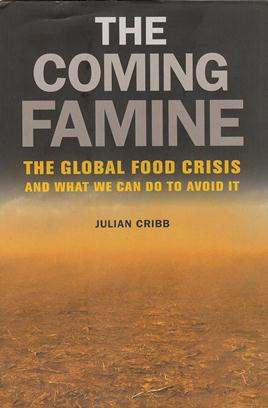Guest Speaker: The Biggest Challenge in 10,000 Years
29 April 2011By Christopher Koetke, CEC, CCE
 Are we heading for a worldwide famine by mid-century? Is our very civilization unsustainable? Is it too late to stop the train and turn it around? The answers are yes, yes and no.
Are we heading for a worldwide famine by mid-century? Is our very civilization unsustainable? Is it too late to stop the train and turn it around? The answers are yes, yes and no.
Julian Cribb, Australian author of The Coming Famine (University of California Press, 2010), paints the picture of a perfect storm in which a number of sustainability issues will reach criticality and come together over the next few decades to portend a worldwide famine that will change the face of our world.
The concept of “peak oil” is something that we’ve all become familiar with over the last decade. Put simply, it’s a situation where demand outpaces the discovery of new reserves of a finite resource, so supply gets scarce and expensive. In Cribb’s estimation, water and agricultural outputs will also reach their peak in the near-term horizon.
In fact, we’re already seeing some evidence. While the United States, Australia and Europe are awash in food, literally throwing half of it away, the rest of the world is not. For the last half century a billion people in the developing world have been going to bed hungry every night. The resulting “food insecurity” has devastating effects.
Food insecurity can result in governmental collapse, conflict and mass migration. It has often been said that war breeds hunger, but Cribb contends that it is exactly the opposite. The Russian and French revolutions started with increased bread prices. And today, the fall of regimes in Tunisia and Egypt started with people in the street protesting the price of bread. Cribb says, “If you scrape away all of the politics, religion and ethnicity on the surface, you’ll find that the true genesis of wars over the last 30 years was related to food, land, and water.”
One of the key issues is management of our fresh water. While the technology is available to clean, recycle and reuse water, most people and governments don’t do it. Instead, they use it, pollute it and throw it away. In the course of a lifetime, each person will consume about 100,000 tons of water, 75% of which goes into food production. Grain bowls are running dry and mined sources of water are running out and won’t be available for that food production.
And, of course, there’s oil. One American think tank sees a time in the foreseeable future when oil could hit $200 to $300 a barrel. Farmers in the developed world wouldn’t be able to pay the $20 a gallon to run their trucks and equipment. In developing nations, where we’ve helped mechanized farming, agriculture would grind to a dead halt.
Add to those factors overpopulation in developing countries, overconsumption in developed countries, climate change and soil depletion, and you have your perfect storm.
It is a storm that we can fend off, however, if we take immediate action. The key is how we produce food. Cribb and others say that no currently practiced method of agriculture is sustainable. While attempts are being made to “green up” the current system, it’s not enough.
Cribb and many other experts agree that we must do two things: 1) Reinvent the way we farm and produce food and 2) reinvent our diets. It is the biggest challenge to survival that humanity has faced in more than 10,000 years, but Cribb believes it is eminently doable and that chefs have an important role to play.
Chefs, he says, set “the fashion of food.” The recent trends toward sustainable fish and seafood, the locavore movement and the growing popularity of heirloom products can all be traced to chefs. As cutting-edge chefs create successful restaurant concepts and menus, other restaurants follow, and these trends then flow through to consumer cookbooks and magazines. Cribb says that the intellectual leadership of the world’s diet rests with chefs. As educators of those future chefs, it is our charge to provide the knowledge they will need to do the job.
Cribb will be the international keynoter at the International Foodservice Sustainability Symposium, May 24-25, 2011, in Chicago. For more information and registration, visit www.ifssustainablity.org. Registration is $249, but enter “NOW” in the discount-code box to save $25. Attendance is limited to 150 people.
Christopher Koetke, CEC, CCE, is executive director of the Kendall College School of Culinary Arts and vice president of Laureate International Universities Center of Excellence in Culinary Arts. Kendall College sponsors the annual CAFÉ/Kendall Green Award.
Additional Info
- CAFÉ Talks Podcast Lesson Plan: 8
